Key cellular mechanism in the body's 'battery' can either spur or stop obesity

Becoming obese or remaining lean can depend on the dynamics of the mitochondria, the body's energy-producing "battery," according to two new studies by Yale School of Medicine researchers featured as the cover story in the Sept. 26 issue of the journal Cell.
Mitochondria are vital cellular organelles that generate and maintain proper energy levels in complex organisms. Using animal models, the Yale research team studied mitochondria in different populations of brain cells known to be involved in the regulation of appetite. The team found that during the transition from a fasting to an over-fed state, mitochondria in neurons that promote hunger show dynamic changes that are the opposite of those found in neurons that control feelings of fullness.
"We've found that mitochondrion need to have ongoing dynamic plasticity in order to support neurons, which are necessary for appetite and for the maintenance of life," said lead author Tamas Horvath, the Jean and David W. Wallace Professor of Biomedical Research and chair of comparative medicine at Yale School of Medicine. "If these dynamic events—during which the mitochondria fuse to become more effective in generating energy—are disrupted, mitochondria become static, appetite-stimulating neurons become less active, and animals do not develop obesity when exposed to high-fat, high-calorie diets."
Yale co-lead author Marcelo O. Dietrich, M.D., said these same cellular events have different consequences in neurons that promote feelings of fullness. These consequences were described in a separate paper in the same issue of Cell, co-authored by Dietrich, Horvath, and a research team in Spain.
The study showed that similar molecular drivers control mitochondria-endoplasmic reticulum interactions and related stress. If the cellular events are disrupted in these mitochondria, animals become morbidly obese.
"The generally accepted view has been that once a cellular biological principle is established in a model system, that principle would hold for most cells of the body. That is clearly not the case here," said Horvath, who points out some practical consideration from the results.
"For example, the mitochondria have been implicated in the development of chronic diseases such as diabetes, cancer, and neurodegeneration, and targeting mitochondria is an emerging therapeutic approach," he notes. "Our results raise doubt about the rationale of systematically targeting any specific mitochondrial mechanism for the treatment of chronic diseases, because in one cell or tissue, it may result in a very different, potentially undesired outcome than in the other."
More information: Cell 155, 1-12 (September 26, 2013)
Journal information: Cell
Provided by Yale University
















